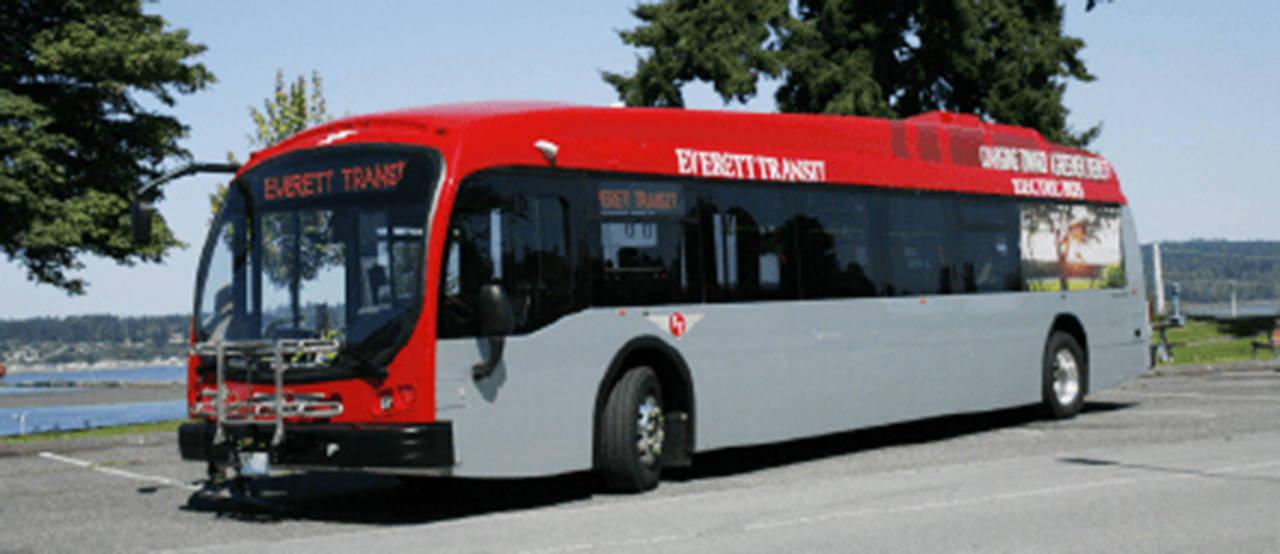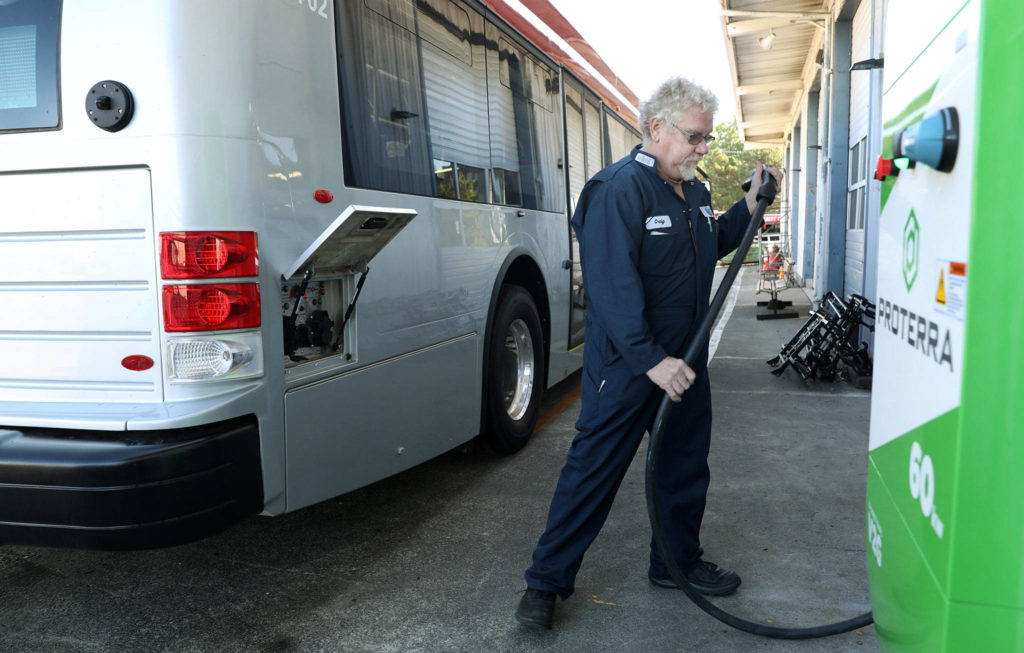EVERETT — In less than two years, Everett Transit has added seven electric buses to its fleet, replaced diesel engines and reduced harmful emissions.
Two more electric buses and their chargers are set to join the fleet within a couple of years after the Everett City Council approved the $1.9 million purchase in December. They’ll replace two diesel buses between 19 and 24 years old.
While the city considers the future of its transit department, it has pursued low-emission and zero-emission goals by replacing diesel engines with electric batteries. Of the city’s 40 buses, seven are battery electric, nine are diesel-electric hybrids and 24 are diesel. By 2022, the city aims to have half of its transit fleet electric.
“The combination of maturing (electric vehicle) technology, environmental concerns, political mandates, the ability to achieve significant savings over diesel consumption and federal grants encouraging the adoption of (electric vehicle) technology in public transportation all contributed to the decision to move towards battery electric buses,” said Everett Transportation Services Director Tom Hingson in an email.
The city didn’t have to put up a dime for the new 40-foot buses or chargers made by Proterra, a company based in California. A Federal Transit Administration grant of $1.3 million will cover most of the cost. The remainder is from a Washington State Department of Ecology grant that stemmed from Volkswagen’s $28.4 million settlement with the state because it installed software in some of its diesel engine vehicles to cheat emissions tests.
Some of that money was marked for electric transit buses by the Legislature.
“For the Volkswagen grants, the goal is to help push this along and not just do incremental improvements,” said Andy Wineke, a spokesman at the Washington State Department of Ecology.
Diesel buses are cheaper to buy at an average cost of around $435,000, according to a Forbes report. The base cost of one of the Proterra buses bought by Everett is $666,082.
“There’s still a challenge in that electric buses are still more expensive than diesel buses,” Wineke said. “That’s the purpose of these grants, to bridge that gap.”
Everett’s first electric bus began service in September 2018. It was dedicated to Route 7, one of the busiest that nearly spans the length of the city from Everett Community College to the Everett Mall. Through this past December, it had logged 34,253 miles.
Three others are used on routes along Broadway and Evergreen Way because the federal grant used to buy the buses required their use in high-impact areas, he said. Another three, purchased with a Washington State Department of Transportation grant, are required to be used along the riverfront and waterfront because they are environmentally sensitive areas.
The seven electric buses on Everett Transit routes have traveled about 121,000 miles, Hingson said.
Similar to the ones already in service, the two new buses will have 31 seats and 16 grab straps for standing passengers. The new buses will not have use restrictions and will be distributed throughout Everett Transit’s system.
It all adds up to reduced fuel and maintenance costs compared to the diesel engine buses. Hingson said the city spent $631,862 on diesel last year. Charging the electric buses costs about $550 per month, per bus.
When the first four electric buses entered Everett Transit service, the city estimated each one would reduce fuel costs by up to 76 % and maintenance expenses by nearly half, compared to a diesel bus. So far, the Proterra buses’ minimal maintenance work has been under warranty.
The city transit system’s electrification has come with minor shocks.
Each bus has a manufacturer range of up to 204 miles on a single charge of the battery. But, like an old gas-powered car’s supposed mileage, the reality is a bit different. Hingson said the electric buses go on an eight-hour shift, about 100 miles, before returning to the operations base for a recharge.
Each electric bus gets two assignments a day, a two- or three-hour commuter run in the morning or evening and an eight-hour stint. Temperature affects battery performance and Everett’s climate is well-suited for battery electric vehicles, he said.
Learning how to operate and maintain the new vehicles and their charging infrastructure has required about $100,000 as well as time. A fall protection system was needed so technicians can operate safely on the electric buses’ roofs, whereas other buses don’t need that access, Hingson said. Personal protective equipment was bought for the technicians so they could work with the high-voltage vehicles.
Bus operators receive two hours to familiarize themselves with the new buses.
“The buses are substantially different than anything we have previously had in our fleet,” he said. “Supervisors have learned how to support operators when they are on the road and face any issues. Technicians are still working with the manufacturer as they learn to service the vehicles.”
Beyond the savings, it’s good news for people’s health.
“Diesel emissions are the single greatest source of toxic air pollution in our state,” Ecology spokesman Wineke said.
The exhaust causes or contributes to asthma, heart and lung diseases, and cancer, according to the Centers for Disease Control and Prevention as well as Ecology.
The largest sources of diesel exhaust in Washington include buses, construction equipment, farm equipment, heavy duty trucks, locomotives and ships. While electric tech isn’t quite up to the rigors of some of those uses, buses were ripe for the transition.
Ben Watanabe: bwatanabe@heraldnet.com; 425-339-3037; Twitter @benwatanabe.
Talk to us
> Give us your news tips.
> Send us a letter to the editor.
> More Herald contact information.


























